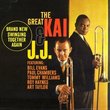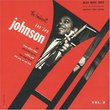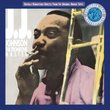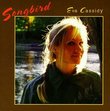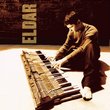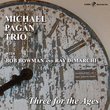| All Artists: J.J. Johnson Title: Standards: Live at the Village Vanguard Members Wishing: 2 Total Copies: 0 Label: Polygram Records Original Release Date: 9/24/1991 Release Date: 9/24/1991 Album Type: Live Genres: Jazz, Pop, Broadway & Vocalists Style: Traditional Vocal Pop Number of Discs: 1 SwapaCD Credits: 1 UPC: 731451005923 |
Search - J.J. Johnson :: Standards: Live at the Village Vanguard
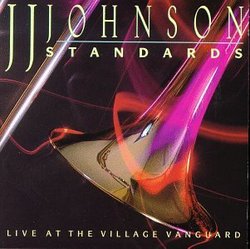 | J.J. Johnson Standards: Live at the Village Vanguard Genres: Jazz, Pop, Broadway & Vocalists
|
Larger Image |
CD DetailsSimilar CDs
Similarly Requested CDs
|
CD ReviewsStandards: Live at the Village JIMWILLOUGHBY | Milledgeville, Georgia United States | 07/22/2001 (4 out of 5 stars) "This is Vol. 2 of a 2 part series recorded at the Village Vanguard in 1988. I love live performances. They often add an emotional excitement that compliments the spontaneity and extemporaneous of the art form itself. The bad news is that many time recordings of live sessions suffer appreciable loss of sound quality. The recording quality of this session is quite good. Every player in group is heard properly and in good balance. I love Rufus Reid's playing. Thad Jones once said he like a bass player who plays bass notes, not cello notes. I do too and Rufus Reid is a master. One the opener See See Rider, his playing reminds me of Charlie Mingus. The group treatment of this tune has a sort of Minus-like feel to it also.I like good swing. I particularly enjoyed the renditions of Just Friends and What is This Thing Called Love. I listened to them over and over. Just Friends, written by John Klenner in 1931, has become a much loved and recorded song by many fine jazz players. The harmonic changes to this tune are fun to play and good for open blowing. JJ takes full advantage. Ralph Moore has long one of my favorite tenor players. His improvisational skills and strong sense of swing are always a joy to hear and are clearly exemplified on "Friends", "What Is this Thing Called" and the other up tempo standards. The Intro of What is This Thing Called Love uses the ostinato or vamp made famous by Clifford Brown in his well know recording of this tune. Rocking good piano solo here. As always, this solo and all others are well supported by Reid on bass and Lewis on drums. This rhythm section's got a groove that don't move.From the Rogers and Hart Songbook, Funny Valentine is outstanding. A gorgeous muted trombone solo from JJ, along with the obbligato, relaxed free style interaction between all the players titillates my sensitive aural palette. J J is again a pleasure to hear on Misty, written by pianist-composer Erroll Garner in 1954. Again, beautiful, sensitive playing from the rhythm section.After food and shelter, one of my basic needs is for a good blues Misterioso satisfies this need and gratifies me plum up one side and down the other. I particularly like the "feel and style" of Moore on tenor on this tune. Man, he is a fine player. His impeccable articulation and phrasing, along with his "fat sound' knock me out. The rhythm section builds up some heat and intensity behind him and it smokes.J J Johnson was the most outstanding trombonist and the major influence on other trombonist after the mid 1940s. His early style of playing exhibited the fastest technique imaginable for a slide trombone player. In fact, many people thought he played valve trombone when they first heard him. His later style of playing is uses more "space" and a lot of musical sequences (a melodic idea repeated beginning on different note in the chord changes.) This style is displayed in this recording. He worked and recorded with Charlie Parker, Betty Carter, Dizzy Gillespie, Miles Davis, Stan Getz, Clark Terry, Sonny Stitt, Fats Navarro, Benny Carter and others "Pretty good company" says I.J J passed away on February 4, 2001, but his wonderful music will be with us forever.Other of my Favorite Recordings by J J Johnson include:® The Eminent Jay Jay Johnson, 1953 Blue Note Vol. 1 ® The Eminent Jay Jay Johnson, 1954 Blue Note Vol. 2" Is it really Live !!? james denson | 11/23/2000 (5 out of 5 stars) "If you are familiar with JJ Johnson, you won't be dissappointed with this CD. For thoses of us who cant get enough of JJ 's music (i own at least 75 of his albums/cds ) this recording was a breath of air. In fact this was the first CD i ever purchased . The music ,the setting, the artist are all outstanding, and just when you think it can't get any better, the second live CD came out. This is truly one of JJ's finest works, and since his recording sessions were so scarce thru the 80's and 90's , this is one you will have to have if you need to 'catch up' on JJ's latest works, or if you don't have any of JJ CD's this is a fine place to start" A Happy Night At The Village Vanguard If Robert J. Ament | Ballwin, MO United States | 05/15/2008 (5 out of 5 stars) "
this music is any indication. Although this was recorded in 1988, I've only had it since about 1995. I play all my collection randomly and upon hearing it once more, decided I should review it....even though it's "old news". At least the last couple were recorded in the '80's where some of my reviews date from the '60's. I think that JJ was one of the finest jazz trombonists of all times and he certainly had not lost his chops at age 64, the time of this recording.This effort was by a quintet that seemed a natural for each other. On the opening cut, "See See Rider", the whole group is having a good time. Besides JJ, Ralph Moore is heard on soprano (I thought he was strictly a tenor man) but my attention was drawn to the excellent rhythm section. When I looked at the cd info I should not have been surprised that the bassist, Rufus Reid, and drummer Victor Lewis made up 2/3 of the rhythm of my last review ("Serenity" Stan Getz) proving that when you're that good, you're always in demand. Stanley Cowell is an excellent modern mainstream pianist and the only conclusion why he is not a more familiar name is that he is underrated. The rest of the set is equally good being eight standards and two JJ originals. All of it is uptempo except the ballads "Misty" and "My Funny Valentine". This is the second recording of this gig, the first being "Quintergy". My personal belief is that this one is much superior probably because the material of "Quintergy" was more diverse in content, displaying many various schools of jazz. If you enjoy live jazz, jazz quintets, any of these great musicians in particular or any combination thereof, you'll enjoy having this one!" |

 Track Listings (10) - Disc #1
Track Listings (10) - Disc #1